International Organizations & Sustainable Tourism Development
VerifiedAdded on 2023/04/08
|8
|1870
|257
Essay
AI Summary
This essay analyzes the roles of international and supranational organizations in the planning and implementation of sustainable tourism development, highlighting the significance of tourism as a major economic activity and foreign-exchange earner for many nations. It discusses the importance of sustainable tourism development, emphasizing the need for development agencies to create income and employment opportunities while minimizing negative environmental and socio-cultural impacts. The essay focuses on the role of the World Tourism Organization (UNWTO) in promoting sustainable tourism globally, generating market knowledge, and fostering tourism education. It also examines the contributions of supranational organizations like the United Nations Environment Programme Finance Initiative and the Asian Development Bank (ADB) in addressing issues such as tourist safety and marine pollution. The essay concludes by noting the importance of global awareness programs and collaborations among stakeholders to overcome challenges and ensure the sustainable development of tourism, acknowledging that tourism is not only about the development of place but also about promoting harmonious coexistence and peace.
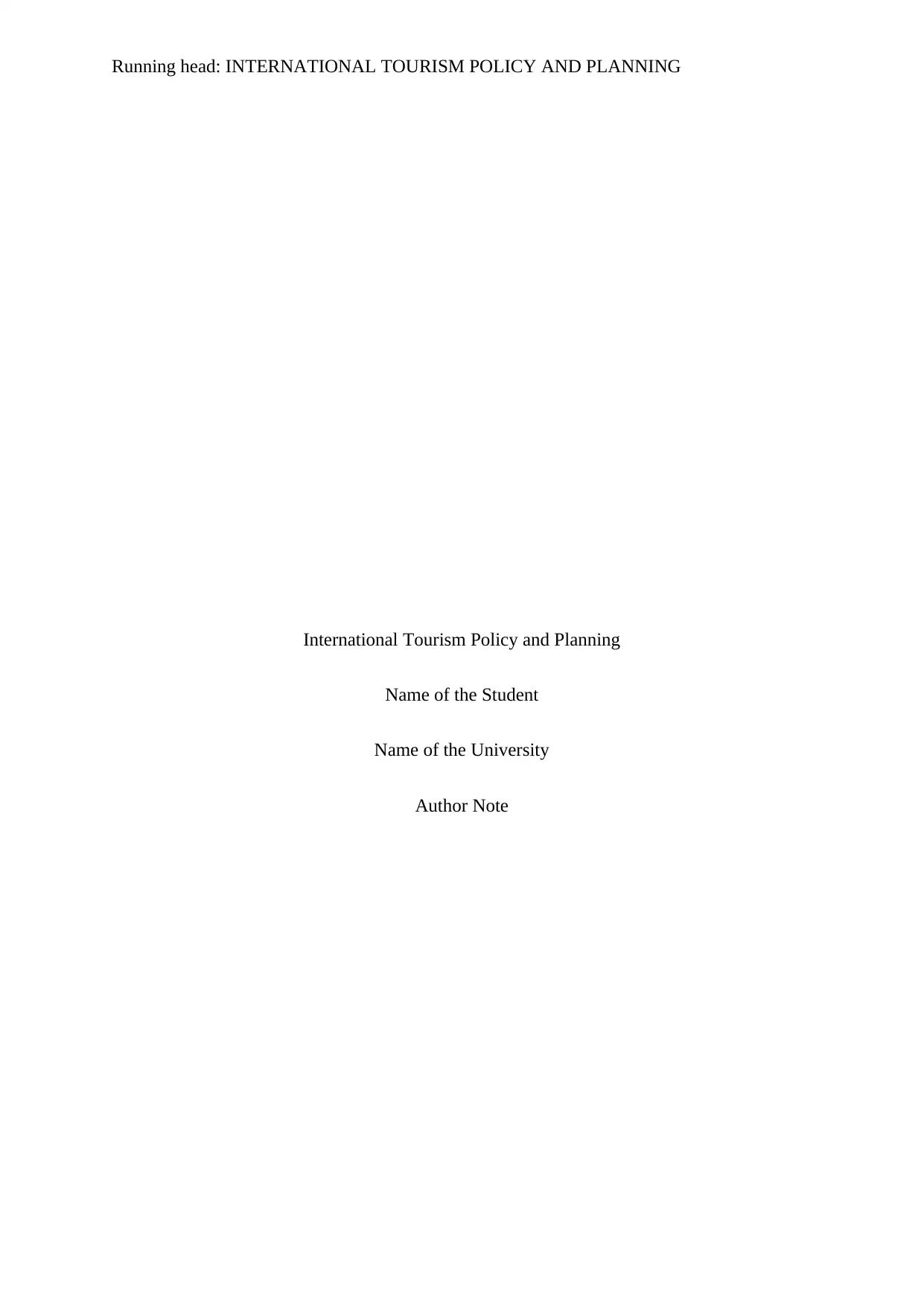
Running head: INTERNATIONAL TOURISM POLICY AND PLANNING
International Tourism Policy and Planning
Name of the Student
Name of the University
Author Note
International Tourism Policy and Planning
Name of the Student
Name of the University
Author Note
Paraphrase This Document
Need a fresh take? Get an instant paraphrase of this document with our AI Paraphraser
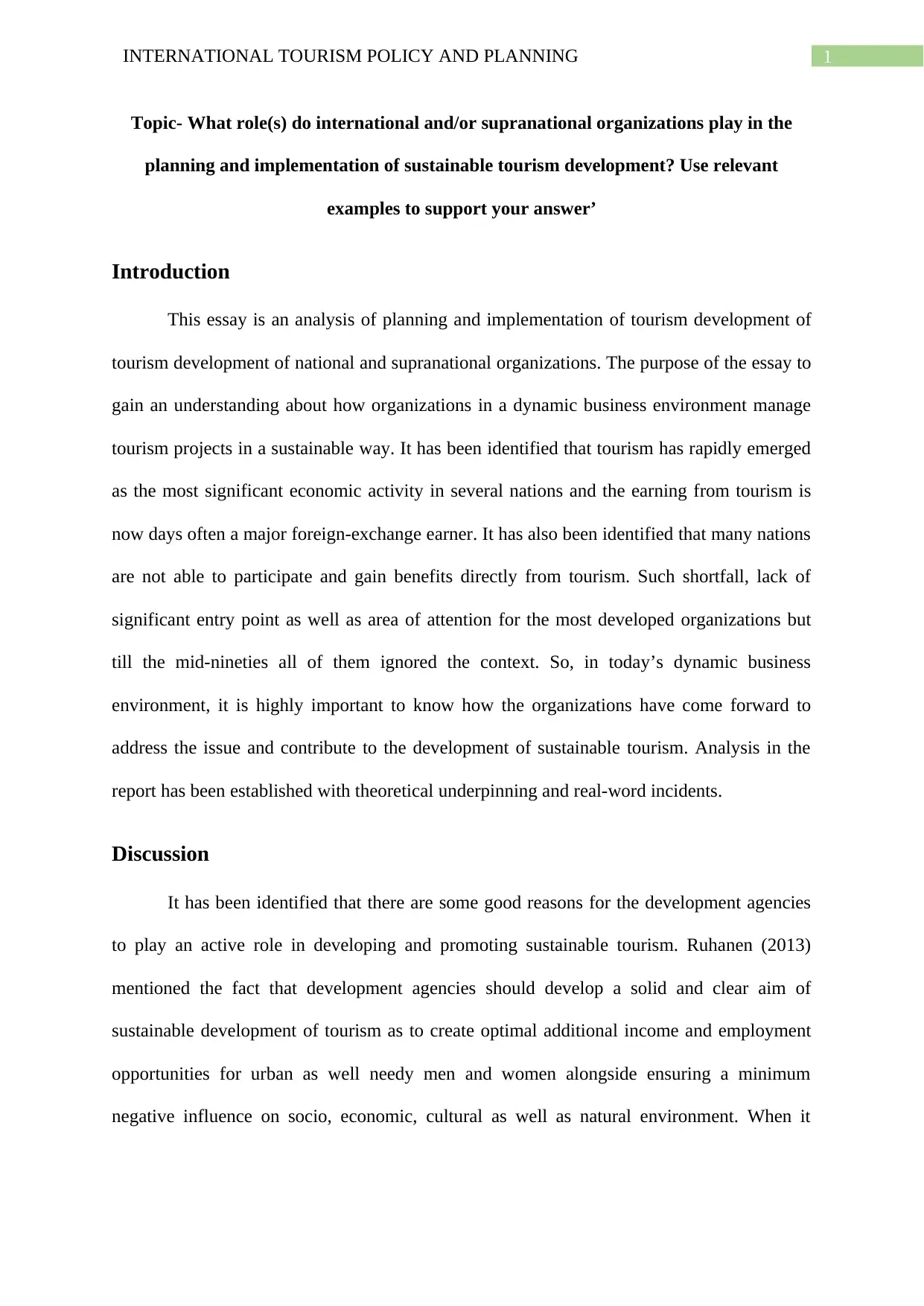
1INTERNATIONAL TOURISM POLICY AND PLANNING
Topic- What role(s) do international and/or supranational organizations play in the
planning and implementation of sustainable tourism development? Use relevant
examples to support your answer’
Introduction
This essay is an analysis of planning and implementation of tourism development of
tourism development of national and supranational organizations. The purpose of the essay to
gain an understanding about how organizations in a dynamic business environment manage
tourism projects in a sustainable way. It has been identified that tourism has rapidly emerged
as the most significant economic activity in several nations and the earning from tourism is
now days often a major foreign-exchange earner. It has also been identified that many nations
are not able to participate and gain benefits directly from tourism. Such shortfall, lack of
significant entry point as well as area of attention for the most developed organizations but
till the mid-nineties all of them ignored the context. So, in today’s dynamic business
environment, it is highly important to know how the organizations have come forward to
address the issue and contribute to the development of sustainable tourism. Analysis in the
report has been established with theoretical underpinning and real-word incidents.
Discussion
It has been identified that there are some good reasons for the development agencies
to play an active role in developing and promoting sustainable tourism. Ruhanen (2013)
mentioned the fact that development agencies should develop a solid and clear aim of
sustainable development of tourism as to create optimal additional income and employment
opportunities for urban as well needy men and women alongside ensuring a minimum
negative influence on socio, economic, cultural as well as natural environment. When it
Topic- What role(s) do international and/or supranational organizations play in the
planning and implementation of sustainable tourism development? Use relevant
examples to support your answer’
Introduction
This essay is an analysis of planning and implementation of tourism development of
tourism development of national and supranational organizations. The purpose of the essay to
gain an understanding about how organizations in a dynamic business environment manage
tourism projects in a sustainable way. It has been identified that tourism has rapidly emerged
as the most significant economic activity in several nations and the earning from tourism is
now days often a major foreign-exchange earner. It has also been identified that many nations
are not able to participate and gain benefits directly from tourism. Such shortfall, lack of
significant entry point as well as area of attention for the most developed organizations but
till the mid-nineties all of them ignored the context. So, in today’s dynamic business
environment, it is highly important to know how the organizations have come forward to
address the issue and contribute to the development of sustainable tourism. Analysis in the
report has been established with theoretical underpinning and real-word incidents.
Discussion
It has been identified that there are some good reasons for the development agencies
to play an active role in developing and promoting sustainable tourism. Ruhanen (2013)
mentioned the fact that development agencies should develop a solid and clear aim of
sustainable development of tourism as to create optimal additional income and employment
opportunities for urban as well needy men and women alongside ensuring a minimum
negative influence on socio, economic, cultural as well as natural environment. When it
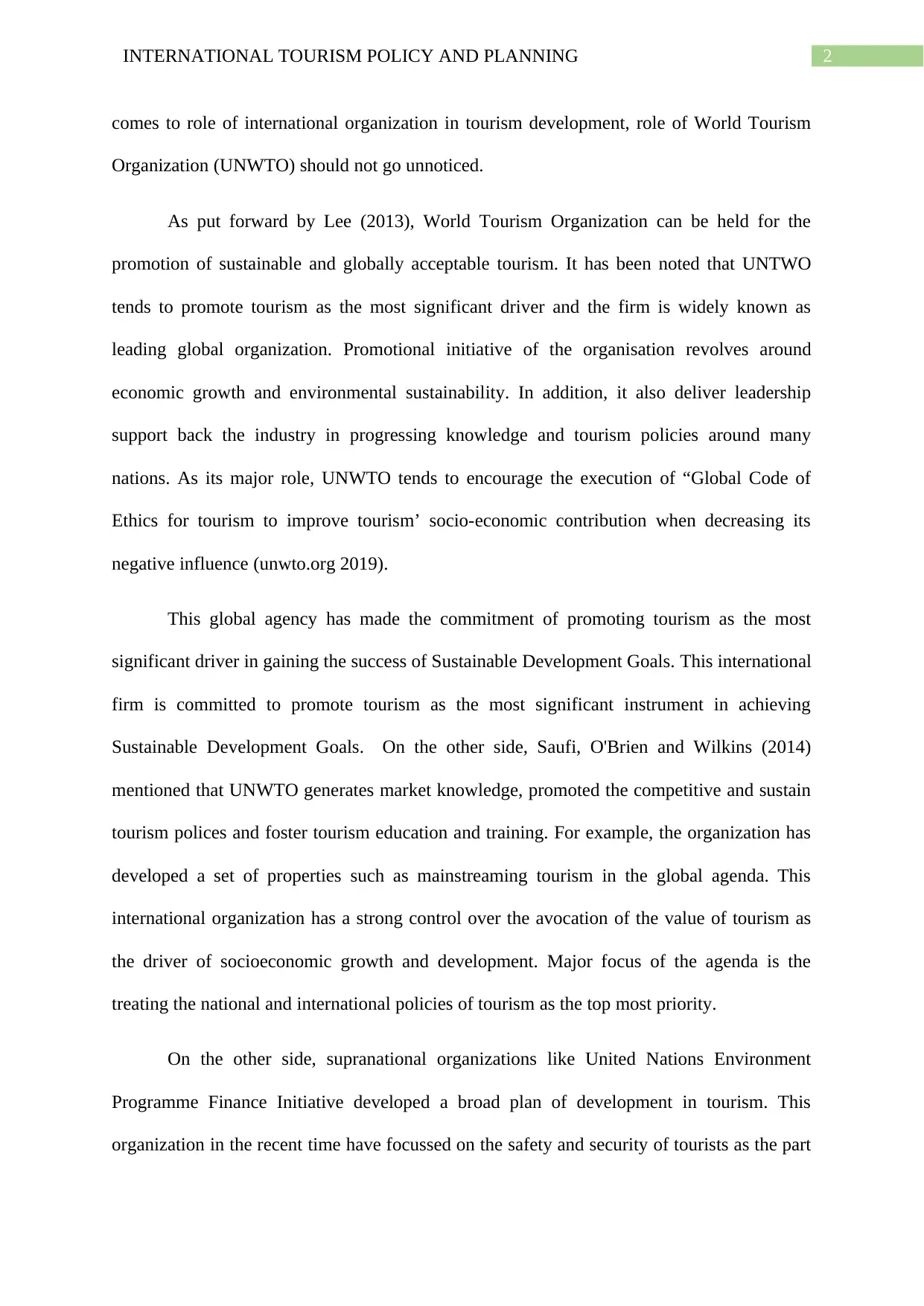
2INTERNATIONAL TOURISM POLICY AND PLANNING
comes to role of international organization in tourism development, role of World Tourism
Organization (UNWTO) should not go unnoticed.
As put forward by Lee (2013), World Tourism Organization can be held for the
promotion of sustainable and globally acceptable tourism. It has been noted that UNTWO
tends to promote tourism as the most significant driver and the firm is widely known as
leading global organization. Promotional initiative of the organisation revolves around
economic growth and environmental sustainability. In addition, it also deliver leadership
support back the industry in progressing knowledge and tourism policies around many
nations. As its major role, UNWTO tends to encourage the execution of “Global Code of
Ethics for tourism to improve tourism’ socio-economic contribution when decreasing its
negative influence (unwto.org 2019).
This global agency has made the commitment of promoting tourism as the most
significant driver in gaining the success of Sustainable Development Goals. This international
firm is committed to promote tourism as the most significant instrument in achieving
Sustainable Development Goals. On the other side, Saufi, O'Brien and Wilkins (2014)
mentioned that UNWTO generates market knowledge, promoted the competitive and sustain
tourism polices and foster tourism education and training. For example, the organization has
developed a set of properties such as mainstreaming tourism in the global agenda. This
international organization has a strong control over the avocation of the value of tourism as
the driver of socioeconomic growth and development. Major focus of the agenda is the
treating the national and international policies of tourism as the top most priority.
On the other side, supranational organizations like United Nations Environment
Programme Finance Initiative developed a broad plan of development in tourism. This
organization in the recent time have focussed on the safety and security of tourists as the part
comes to role of international organization in tourism development, role of World Tourism
Organization (UNWTO) should not go unnoticed.
As put forward by Lee (2013), World Tourism Organization can be held for the
promotion of sustainable and globally acceptable tourism. It has been noted that UNTWO
tends to promote tourism as the most significant driver and the firm is widely known as
leading global organization. Promotional initiative of the organisation revolves around
economic growth and environmental sustainability. In addition, it also deliver leadership
support back the industry in progressing knowledge and tourism policies around many
nations. As its major role, UNWTO tends to encourage the execution of “Global Code of
Ethics for tourism to improve tourism’ socio-economic contribution when decreasing its
negative influence (unwto.org 2019).
This global agency has made the commitment of promoting tourism as the most
significant driver in gaining the success of Sustainable Development Goals. This international
firm is committed to promote tourism as the most significant instrument in achieving
Sustainable Development Goals. On the other side, Saufi, O'Brien and Wilkins (2014)
mentioned that UNWTO generates market knowledge, promoted the competitive and sustain
tourism polices and foster tourism education and training. For example, the organization has
developed a set of properties such as mainstreaming tourism in the global agenda. This
international organization has a strong control over the avocation of the value of tourism as
the driver of socioeconomic growth and development. Major focus of the agenda is the
treating the national and international policies of tourism as the top most priority.
On the other side, supranational organizations like United Nations Environment
Programme Finance Initiative developed a broad plan of development in tourism. This
organization in the recent time have focussed on the safety and security of tourists as the part
⊘ This is a preview!⊘
Do you want full access?
Subscribe today to unlock all pages.

Trusted by 1+ million students worldwide
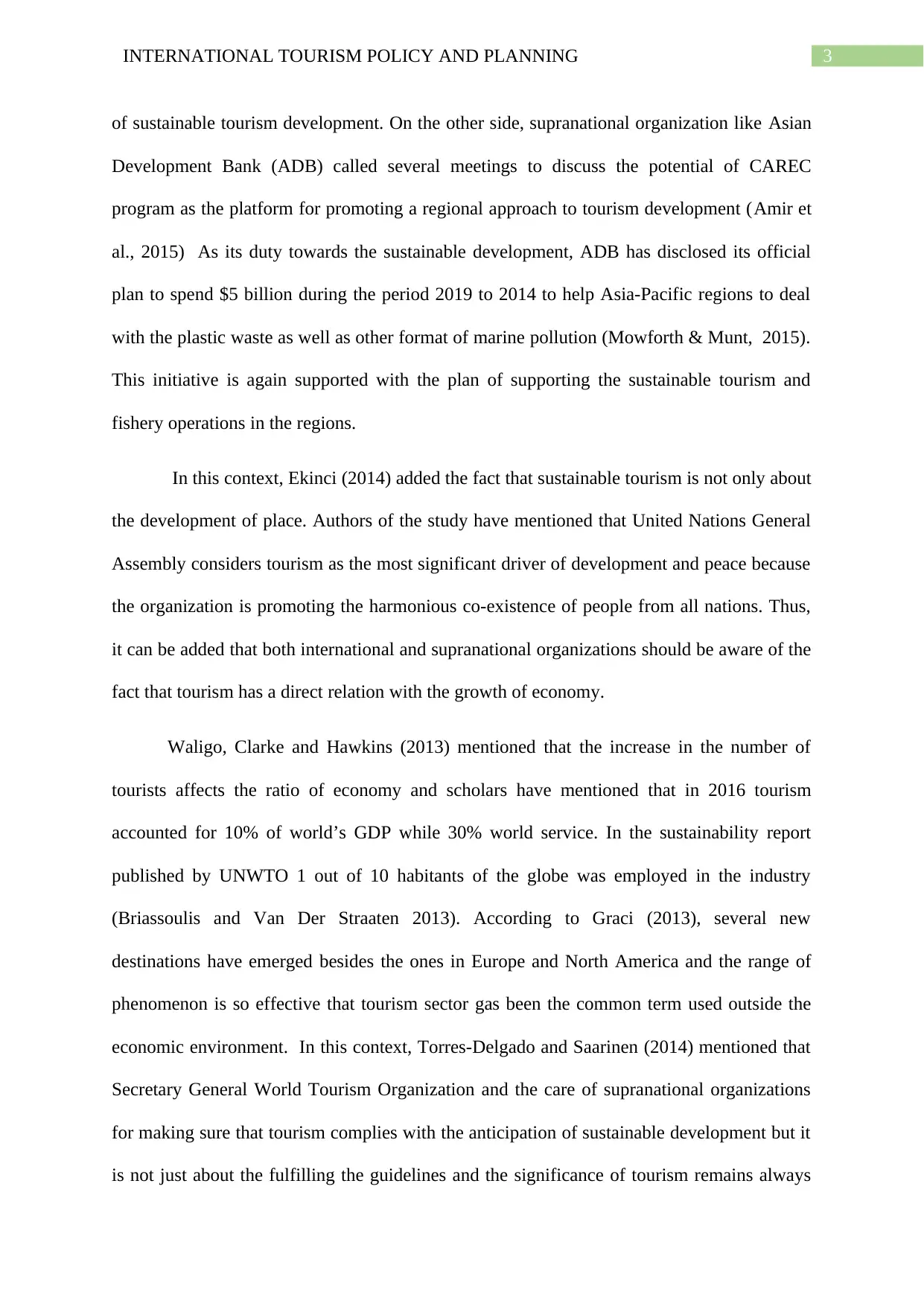
3INTERNATIONAL TOURISM POLICY AND PLANNING
of sustainable tourism development. On the other side, supranational organization like Asian
Development Bank (ADB) called several meetings to discuss the potential of CAREC
program as the platform for promoting a regional approach to tourism development (Amir et
al., 2015) As its duty towards the sustainable development, ADB has disclosed its official
plan to spend $5 billion during the period 2019 to 2014 to help Asia-Pacific regions to deal
with the plastic waste as well as other format of marine pollution (Mowforth & Munt, 2015).
This initiative is again supported with the plan of supporting the sustainable tourism and
fishery operations in the regions.
In this context, Ekinci (2014) added the fact that sustainable tourism is not only about
the development of place. Authors of the study have mentioned that United Nations General
Assembly considers tourism as the most significant driver of development and peace because
the organization is promoting the harmonious co-existence of people from all nations. Thus,
it can be added that both international and supranational organizations should be aware of the
fact that tourism has a direct relation with the growth of economy.
Waligo, Clarke and Hawkins (2013) mentioned that the increase in the number of
tourists affects the ratio of economy and scholars have mentioned that in 2016 tourism
accounted for 10% of world’s GDP while 30% world service. In the sustainability report
published by UNWTO 1 out of 10 habitants of the globe was employed in the industry
(Briassoulis and Van Der Straaten 2013). According to Graci (2013), several new
destinations have emerged besides the ones in Europe and North America and the range of
phenomenon is so effective that tourism sector gas been the common term used outside the
economic environment. In this context, Torres-Delgado and Saarinen (2014) mentioned that
Secretary General World Tourism Organization and the care of supranational organizations
for making sure that tourism complies with the anticipation of sustainable development but it
is not just about the fulfilling the guidelines and the significance of tourism remains always
of sustainable tourism development. On the other side, supranational organization like Asian
Development Bank (ADB) called several meetings to discuss the potential of CAREC
program as the platform for promoting a regional approach to tourism development (Amir et
al., 2015) As its duty towards the sustainable development, ADB has disclosed its official
plan to spend $5 billion during the period 2019 to 2014 to help Asia-Pacific regions to deal
with the plastic waste as well as other format of marine pollution (Mowforth & Munt, 2015).
This initiative is again supported with the plan of supporting the sustainable tourism and
fishery operations in the regions.
In this context, Ekinci (2014) added the fact that sustainable tourism is not only about
the development of place. Authors of the study have mentioned that United Nations General
Assembly considers tourism as the most significant driver of development and peace because
the organization is promoting the harmonious co-existence of people from all nations. Thus,
it can be added that both international and supranational organizations should be aware of the
fact that tourism has a direct relation with the growth of economy.
Waligo, Clarke and Hawkins (2013) mentioned that the increase in the number of
tourists affects the ratio of economy and scholars have mentioned that in 2016 tourism
accounted for 10% of world’s GDP while 30% world service. In the sustainability report
published by UNWTO 1 out of 10 habitants of the globe was employed in the industry
(Briassoulis and Van Der Straaten 2013). According to Graci (2013), several new
destinations have emerged besides the ones in Europe and North America and the range of
phenomenon is so effective that tourism sector gas been the common term used outside the
economic environment. In this context, Torres-Delgado and Saarinen (2014) mentioned that
Secretary General World Tourism Organization and the care of supranational organizations
for making sure that tourism complies with the anticipation of sustainable development but it
is not just about the fulfilling the guidelines and the significance of tourism remains always
Paraphrase This Document
Need a fresh take? Get an instant paraphrase of this document with our AI Paraphraser
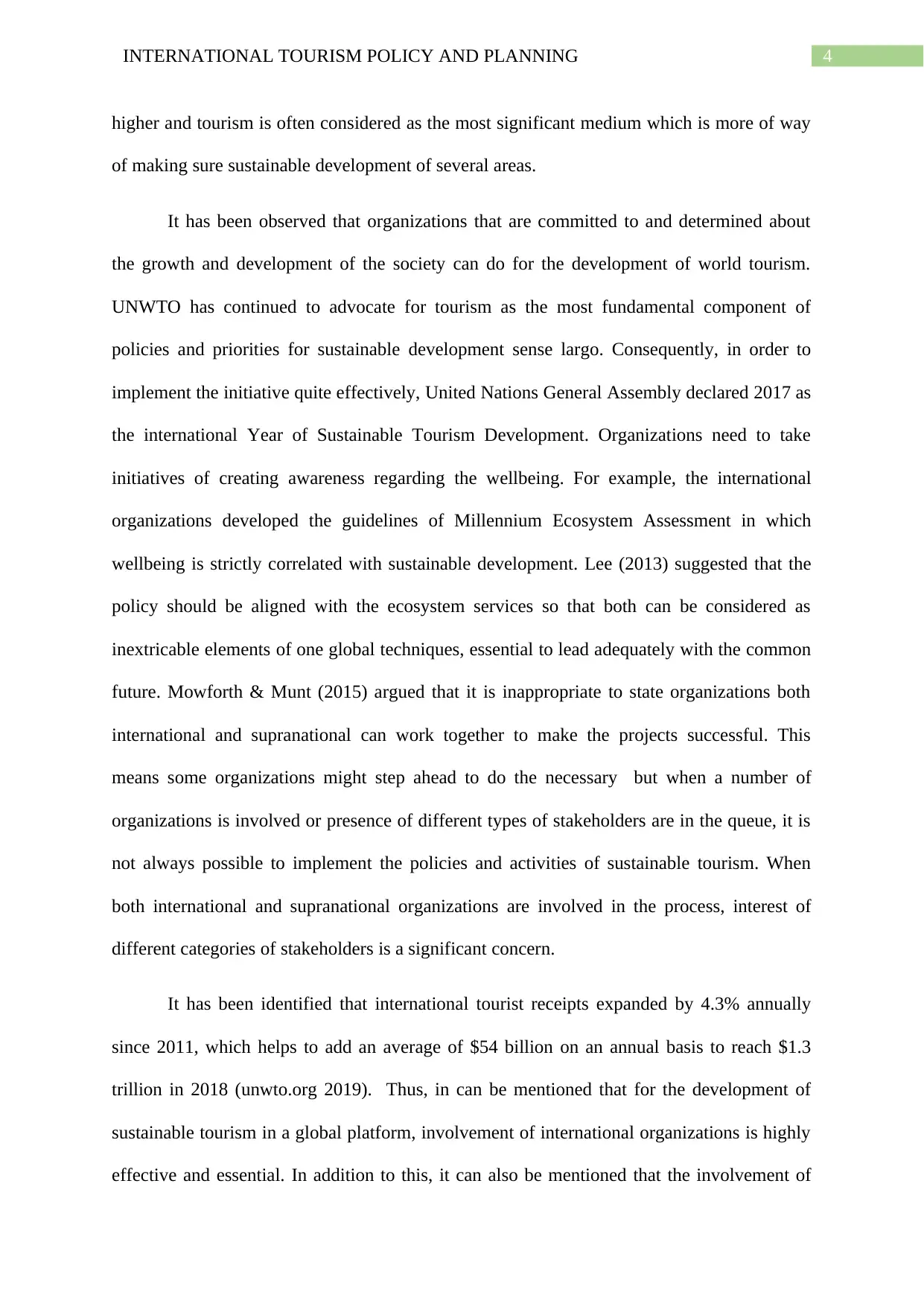
4INTERNATIONAL TOURISM POLICY AND PLANNING
higher and tourism is often considered as the most significant medium which is more of way
of making sure sustainable development of several areas.
It has been observed that organizations that are committed to and determined about
the growth and development of the society can do for the development of world tourism.
UNWTO has continued to advocate for tourism as the most fundamental component of
policies and priorities for sustainable development sense largo. Consequently, in order to
implement the initiative quite effectively, United Nations General Assembly declared 2017 as
the international Year of Sustainable Tourism Development. Organizations need to take
initiatives of creating awareness regarding the wellbeing. For example, the international
organizations developed the guidelines of Millennium Ecosystem Assessment in which
wellbeing is strictly correlated with sustainable development. Lee (2013) suggested that the
policy should be aligned with the ecosystem services so that both can be considered as
inextricable elements of one global techniques, essential to lead adequately with the common
future. Mowforth & Munt (2015) argued that it is inappropriate to state organizations both
international and supranational can work together to make the projects successful. This
means some organizations might step ahead to do the necessary but when a number of
organizations is involved or presence of different types of stakeholders are in the queue, it is
not always possible to implement the policies and activities of sustainable tourism. When
both international and supranational organizations are involved in the process, interest of
different categories of stakeholders is a significant concern.
It has been identified that international tourist receipts expanded by 4.3% annually
since 2011, which helps to add an average of $54 billion on an annual basis to reach $1.3
trillion in 2018 (unwto.org 2019). Thus, in can be mentioned that for the development of
sustainable tourism in a global platform, involvement of international organizations is highly
effective and essential. In addition to this, it can also be mentioned that the involvement of
higher and tourism is often considered as the most significant medium which is more of way
of making sure sustainable development of several areas.
It has been observed that organizations that are committed to and determined about
the growth and development of the society can do for the development of world tourism.
UNWTO has continued to advocate for tourism as the most fundamental component of
policies and priorities for sustainable development sense largo. Consequently, in order to
implement the initiative quite effectively, United Nations General Assembly declared 2017 as
the international Year of Sustainable Tourism Development. Organizations need to take
initiatives of creating awareness regarding the wellbeing. For example, the international
organizations developed the guidelines of Millennium Ecosystem Assessment in which
wellbeing is strictly correlated with sustainable development. Lee (2013) suggested that the
policy should be aligned with the ecosystem services so that both can be considered as
inextricable elements of one global techniques, essential to lead adequately with the common
future. Mowforth & Munt (2015) argued that it is inappropriate to state organizations both
international and supranational can work together to make the projects successful. This
means some organizations might step ahead to do the necessary but when a number of
organizations is involved or presence of different types of stakeholders are in the queue, it is
not always possible to implement the policies and activities of sustainable tourism. When
both international and supranational organizations are involved in the process, interest of
different categories of stakeholders is a significant concern.
It has been identified that international tourist receipts expanded by 4.3% annually
since 2011, which helps to add an average of $54 billion on an annual basis to reach $1.3
trillion in 2018 (unwto.org 2019). Thus, in can be mentioned that for the development of
sustainable tourism in a global platform, involvement of international organizations is highly
effective and essential. In addition to this, it can also be mentioned that the involvement of
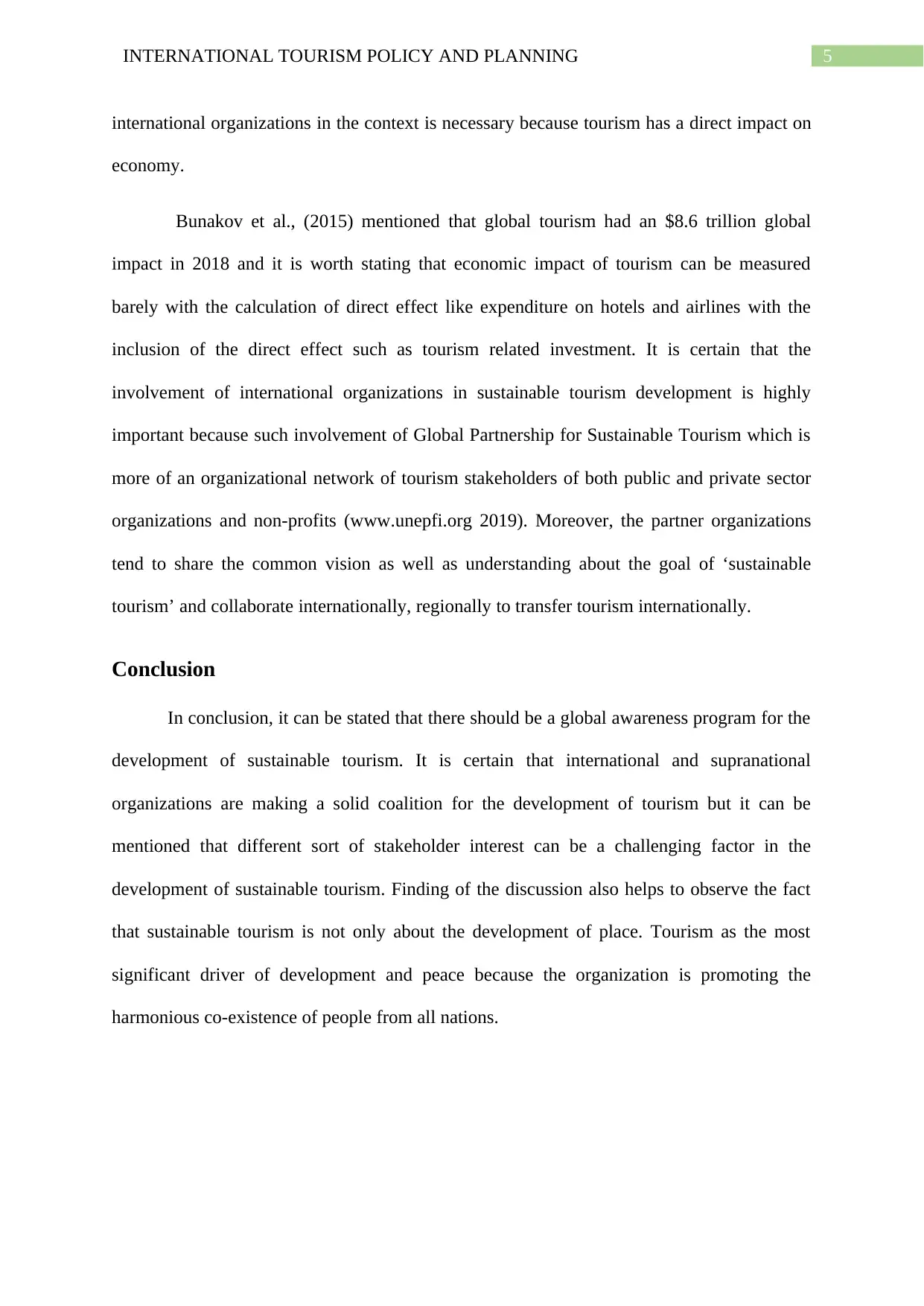
5INTERNATIONAL TOURISM POLICY AND PLANNING
international organizations in the context is necessary because tourism has a direct impact on
economy.
Bunakov et al., (2015) mentioned that global tourism had an $8.6 trillion global
impact in 2018 and it is worth stating that economic impact of tourism can be measured
barely with the calculation of direct effect like expenditure on hotels and airlines with the
inclusion of the direct effect such as tourism related investment. It is certain that the
involvement of international organizations in sustainable tourism development is highly
important because such involvement of Global Partnership for Sustainable Tourism which is
more of an organizational network of tourism stakeholders of both public and private sector
organizations and non-profits (www.unepfi.org 2019). Moreover, the partner organizations
tend to share the common vision as well as understanding about the goal of ‘sustainable
tourism’ and collaborate internationally, regionally to transfer tourism internationally.
Conclusion
In conclusion, it can be stated that there should be a global awareness program for the
development of sustainable tourism. It is certain that international and supranational
organizations are making a solid coalition for the development of tourism but it can be
mentioned that different sort of stakeholder interest can be a challenging factor in the
development of sustainable tourism. Finding of the discussion also helps to observe the fact
that sustainable tourism is not only about the development of place. Tourism as the most
significant driver of development and peace because the organization is promoting the
harmonious co-existence of people from all nations.
international organizations in the context is necessary because tourism has a direct impact on
economy.
Bunakov et al., (2015) mentioned that global tourism had an $8.6 trillion global
impact in 2018 and it is worth stating that economic impact of tourism can be measured
barely with the calculation of direct effect like expenditure on hotels and airlines with the
inclusion of the direct effect such as tourism related investment. It is certain that the
involvement of international organizations in sustainable tourism development is highly
important because such involvement of Global Partnership for Sustainable Tourism which is
more of an organizational network of tourism stakeholders of both public and private sector
organizations and non-profits (www.unepfi.org 2019). Moreover, the partner organizations
tend to share the common vision as well as understanding about the goal of ‘sustainable
tourism’ and collaborate internationally, regionally to transfer tourism internationally.
Conclusion
In conclusion, it can be stated that there should be a global awareness program for the
development of sustainable tourism. It is certain that international and supranational
organizations are making a solid coalition for the development of tourism but it can be
mentioned that different sort of stakeholder interest can be a challenging factor in the
development of sustainable tourism. Finding of the discussion also helps to observe the fact
that sustainable tourism is not only about the development of place. Tourism as the most
significant driver of development and peace because the organization is promoting the
harmonious co-existence of people from all nations.
⊘ This is a preview!⊘
Do you want full access?
Subscribe today to unlock all pages.

Trusted by 1+ million students worldwide
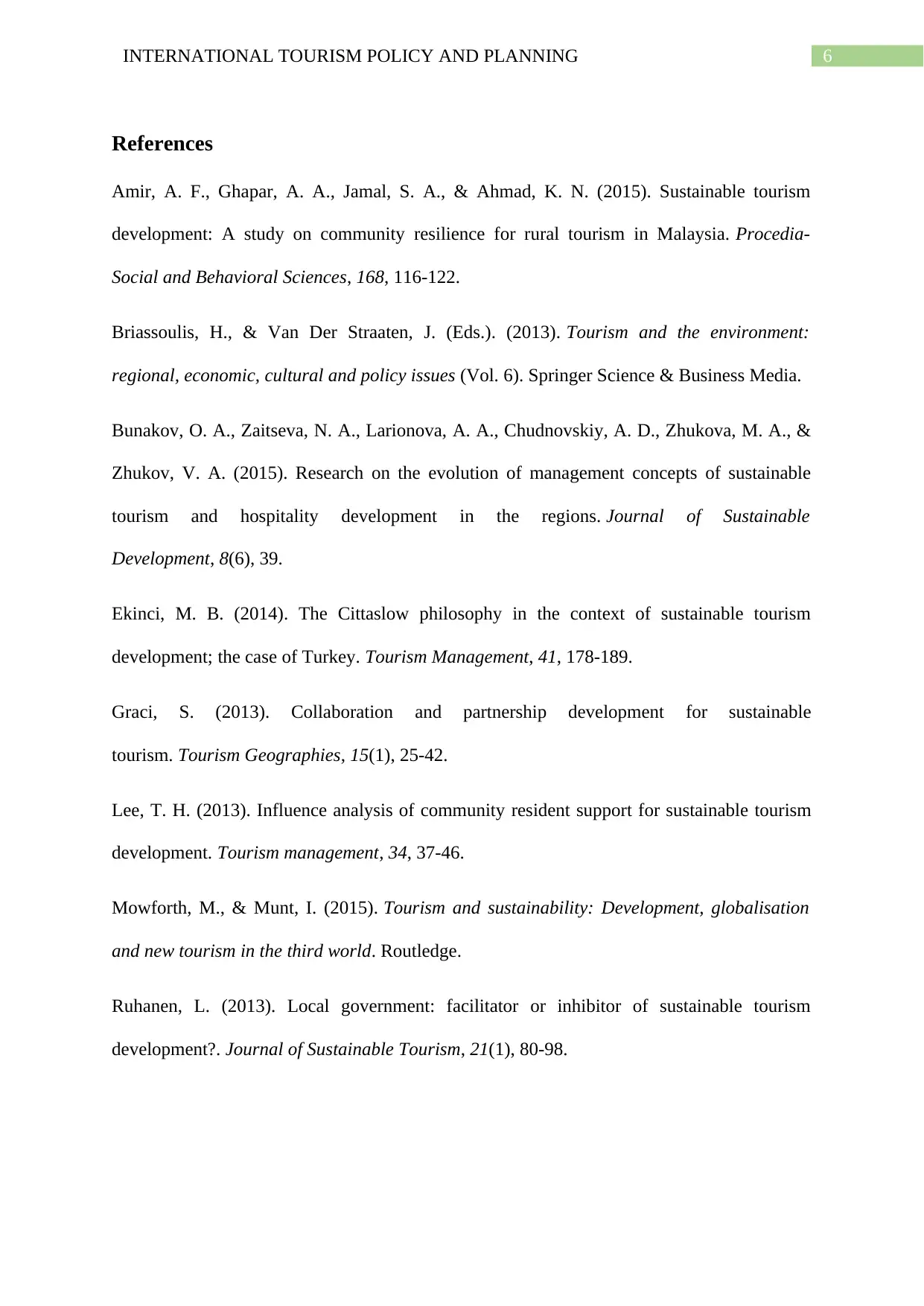
6INTERNATIONAL TOURISM POLICY AND PLANNING
References
Amir, A. F., Ghapar, A. A., Jamal, S. A., & Ahmad, K. N. (2015). Sustainable tourism
development: A study on community resilience for rural tourism in Malaysia. Procedia-
Social and Behavioral Sciences, 168, 116-122.
Briassoulis, H., & Van Der Straaten, J. (Eds.). (2013). Tourism and the environment:
regional, economic, cultural and policy issues (Vol. 6). Springer Science & Business Media.
Bunakov, O. A., Zaitseva, N. A., Larionova, A. A., Chudnovskiy, A. D., Zhukova, M. A., &
Zhukov, V. A. (2015). Research on the evolution of management concepts of sustainable
tourism and hospitality development in the regions. Journal of Sustainable
Development, 8(6), 39.
Ekinci, M. B. (2014). The Cittaslow philosophy in the context of sustainable tourism
development; the case of Turkey. Tourism Management, 41, 178-189.
Graci, S. (2013). Collaboration and partnership development for sustainable
tourism. Tourism Geographies, 15(1), 25-42.
Lee, T. H. (2013). Influence analysis of community resident support for sustainable tourism
development. Tourism management, 34, 37-46.
Mowforth, M., & Munt, I. (2015). Tourism and sustainability: Development, globalisation
and new tourism in the third world. Routledge.
Ruhanen, L. (2013). Local government: facilitator or inhibitor of sustainable tourism
development?. Journal of Sustainable Tourism, 21(1), 80-98.
References
Amir, A. F., Ghapar, A. A., Jamal, S. A., & Ahmad, K. N. (2015). Sustainable tourism
development: A study on community resilience for rural tourism in Malaysia. Procedia-
Social and Behavioral Sciences, 168, 116-122.
Briassoulis, H., & Van Der Straaten, J. (Eds.). (2013). Tourism and the environment:
regional, economic, cultural and policy issues (Vol. 6). Springer Science & Business Media.
Bunakov, O. A., Zaitseva, N. A., Larionova, A. A., Chudnovskiy, A. D., Zhukova, M. A., &
Zhukov, V. A. (2015). Research on the evolution of management concepts of sustainable
tourism and hospitality development in the regions. Journal of Sustainable
Development, 8(6), 39.
Ekinci, M. B. (2014). The Cittaslow philosophy in the context of sustainable tourism
development; the case of Turkey. Tourism Management, 41, 178-189.
Graci, S. (2013). Collaboration and partnership development for sustainable
tourism. Tourism Geographies, 15(1), 25-42.
Lee, T. H. (2013). Influence analysis of community resident support for sustainable tourism
development. Tourism management, 34, 37-46.
Mowforth, M., & Munt, I. (2015). Tourism and sustainability: Development, globalisation
and new tourism in the third world. Routledge.
Ruhanen, L. (2013). Local government: facilitator or inhibitor of sustainable tourism
development?. Journal of Sustainable Tourism, 21(1), 80-98.
Paraphrase This Document
Need a fresh take? Get an instant paraphrase of this document with our AI Paraphraser
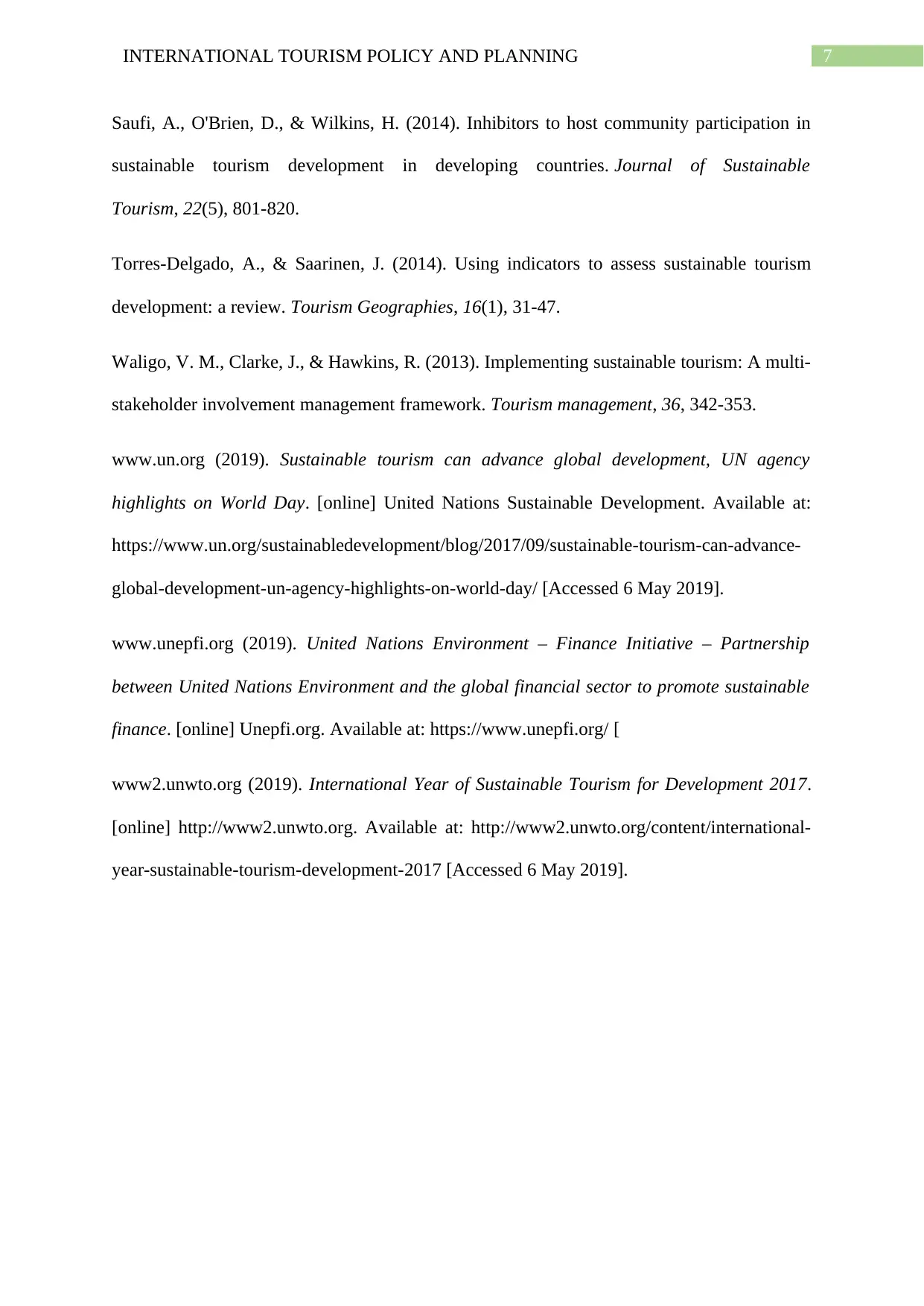
7INTERNATIONAL TOURISM POLICY AND PLANNING
Saufi, A., O'Brien, D., & Wilkins, H. (2014). Inhibitors to host community participation in
sustainable tourism development in developing countries. Journal of Sustainable
Tourism, 22(5), 801-820.
Torres-Delgado, A., & Saarinen, J. (2014). Using indicators to assess sustainable tourism
development: a review. Tourism Geographies, 16(1), 31-47.
Waligo, V. M., Clarke, J., & Hawkins, R. (2013). Implementing sustainable tourism: A multi-
stakeholder involvement management framework. Tourism management, 36, 342-353.
www.un.org (2019). Sustainable tourism can advance global development, UN agency
highlights on World Day. [online] United Nations Sustainable Development. Available at:
https://www.un.org/sustainabledevelopment/blog/2017/09/sustainable-tourism-can-advance-
global-development-un-agency-highlights-on-world-day/ [Accessed 6 May 2019].
www.unepfi.org (2019). United Nations Environment – Finance Initiative – Partnership
between United Nations Environment and the global financial sector to promote sustainable
finance. [online] Unepfi.org. Available at: https://www.unepfi.org/ [
www2.unwto.org (2019). International Year of Sustainable Tourism for Development 2017.
[online] http://www2.unwto.org. Available at: http://www2.unwto.org/content/international-
year-sustainable-tourism-development-2017 [Accessed 6 May 2019].
Saufi, A., O'Brien, D., & Wilkins, H. (2014). Inhibitors to host community participation in
sustainable tourism development in developing countries. Journal of Sustainable
Tourism, 22(5), 801-820.
Torres-Delgado, A., & Saarinen, J. (2014). Using indicators to assess sustainable tourism
development: a review. Tourism Geographies, 16(1), 31-47.
Waligo, V. M., Clarke, J., & Hawkins, R. (2013). Implementing sustainable tourism: A multi-
stakeholder involvement management framework. Tourism management, 36, 342-353.
www.un.org (2019). Sustainable tourism can advance global development, UN agency
highlights on World Day. [online] United Nations Sustainable Development. Available at:
https://www.un.org/sustainabledevelopment/blog/2017/09/sustainable-tourism-can-advance-
global-development-un-agency-highlights-on-world-day/ [Accessed 6 May 2019].
www.unepfi.org (2019). United Nations Environment – Finance Initiative – Partnership
between United Nations Environment and the global financial sector to promote sustainable
finance. [online] Unepfi.org. Available at: https://www.unepfi.org/ [
www2.unwto.org (2019). International Year of Sustainable Tourism for Development 2017.
[online] http://www2.unwto.org. Available at: http://www2.unwto.org/content/international-
year-sustainable-tourism-development-2017 [Accessed 6 May 2019].
1 out of 8
Related Documents
Your All-in-One AI-Powered Toolkit for Academic Success.
+13062052269
info@desklib.com
Available 24*7 on WhatsApp / Email
![[object Object]](/_next/static/media/star-bottom.7253800d.svg)
Unlock your academic potential
Copyright © 2020–2026 A2Z Services. All Rights Reserved. Developed and managed by ZUCOL.





